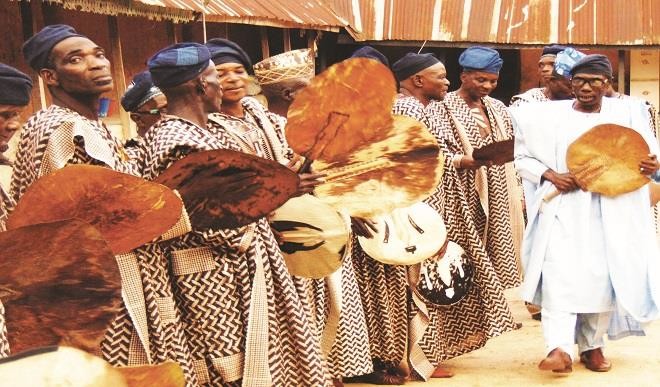Another group comes out in style
One special moment during the recent Igogo festival which held in Owo, was the hour when the Ero dance was performed. Ero represents an age grade in the town and a group is prepared 9 years in advance. Ero is the transition to senior citizenship among the people of Owo, and it is a grade […]


One special moment during the recent Igogo festival which held in Owo, was the hour when the Ero dance was performed. Ero represents an age grade in the town and a group is prepared 9 years in advance. Ero is the transition to senior citizenship among the people of Owo, and it is a grade which groups strive with all their strength to attain. One source describes it “as an age of atonement. It is like the last thing you do before dying.”
Owo has a number of age grades. The first one which is for the youths is known as the Ugbamas. This is the first stage of recognition in the town. The next group is that of the Ughares,and these are the elders. It is from the Ughares that a group is selected who perform the Ero festival. Every Igogo festival is an opportunity to see one group moving forward, and to witness the new grade which is just about to step into their shoes.
According to Prince Adeleke Olateru-Olagbegi “Every year during the Igogo festival, the group comes out for a form of acknowledgement. The ones among them who wear the large robes (Agbada) are those that are going to perform the Ero, while the ones in wrappers are those coming in to take the place of the latter 9 years hence. As the ones in the robes move on after the Ero, those in wrappers will now wear the outfit, and a new set comes in again wearing the wrappers. This is how the age grades are arranged in Owo.”
According to the prince “The men in robes cut a unique sight. They carry hand fans which also double as a drum, or at least they serve as items that can help to create or sustain a beat, as the group walks in procession around the town. As they go round the town either in the rain or sunshine, they have to entertain themselves,” says Olateru-Olagbegi.
When the men sing,they employ the form of song and chorus, in the sense that there is one man singing, to which the others respond in a chorus. The one who sings is known as the Olotuwa. All this while the men beat the hand fans and dance briefly at one spot. The man who sings solo raises his voice and widens his lips, and this is all part of the performance. Those who sing as the chorus, may also dance and they wait for the solo performer to end his song. Then they sing.
Another man may come out to sing solo, and the former soloist becomes part of the chorus. The men engage in a series of chants, and they pray for the Olowo as well as for each other. In sum, the Ero dance translates the elders into becoming revered senior citizens (Ero). In the performance, the voice is an important element and the soloist reveals this very well. Other important elements are the robes and the hand fans, and to an extent the impressive low hanging roofs which encircle the court within which the performers display their art, and all these are well worth witnessing.
